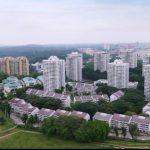Home sharing platforms (HSPs), boosted by increasing internet penetration rates globally, have helped to rapidly expand the short-term rentals market, said a recent report by DBS. The special report on home sharing platforms added that enabling residential homes to add to supply in the hospitality sector, could benefit the travel market in general but increases competition for existing hotel players.
 Having already taken significant market share in North America and Europe, home sharing platforms are turning their attention to the Asia Pacific, said the report. The DBS research indicated that growth in Asia’s short-term rental market is set to supersede those of North America and Europe at a staggering 27%.
Having already taken significant market share in North America and Europe, home sharing platforms are turning their attention to the Asia Pacific, said the report. The DBS research indicated that growth in Asia’s short-term rental market is set to supersede those of North America and Europe at a staggering 27%.
The report on home sharing platforms aimed to answer the question of, “with the short-term rental market in Asia set to grow to US$25 billion by 2023, what does the future hold for conventional hoteliers? Will they stand the test of time in this age of digital disruption?”
DBS noted that in Singapore, the regulator has made it clear that short-term rental is legal. However, the minimum 3-month rental period for private residential properties and minimum 6-month rental period for public housing (only a foreigner on an employment pass is allowed for public housing) are prohibitive to the growth of home sharing platforms in Singapore. Hence, the level of development for Singapore’s short-term rental regulatory framework is relatively low.
The level of restriction is high, prohibiting the proliferation of home sharing platforms.
Table of Contents
From 2014 to 2018, HDB dealt with 3,300 unauthorised flat rental cases, revealed the Minister of National Development. The Minister revealed the statistics on unauthorised flat rental cases in a written reply to a parliamentary question, in July 2019.
The Minister, Mr Lawrence Wong, was responding to a parliamentary question by Cheng Li Hui, Member of Parliament for Tampines GRC. Ms Cheng asked:
“Over the last five years, what is the number of complaints received by HDB pertaining to foreign tenants in HDB estates; what is the nature of these complaints; how does HDB follow up on the complaints; and whether measures are in place to help first-time foreign tenants of HDB flats familiarise with the norms and practices in HDB estates as well as living in Singapore.”
In revealing the figures on unauthorised flat rental cases dealt with by HDB, Mr Wong said:
“From 2014 to 2018, HDB received about 3,300 cases of feedback on suspected unauthorised flat rentals, dis-amenities or overcrowding of HDB flats by foreign and non-foreign tenants. HDB investigates every case of public feedback received, on top of the proactive inspections that it carries out. Depending on the severity and circumstances of the infringement, HDB may issue a written warning, impose a financial penalty, or acquire the flats compulsorily from the owners.
HDB actively promotes gracious and harmonious living in public housing through various initiatives. For example, HDB has a network of volunteers to help spread tips on neighbourliness at community events and door-to-door visits. HDB also gives out the Good Neighbour Awards to recognise individuals who have gone the extra mile with their acts of neighbourliness.
Besides HDB’s efforts, there are also initiatives undertaken by other government agencies. For example, the People’s Association’s nationwide network of more than 1,400 Integration and Naturalisation Champions reach out to new immigrants and help them settle into the community. The National Integration Council works with community groups, immigrant associations, schools, and other partners to help foreigners and immigrants understand our local laws, norms and culture.”
Besides revealing the data on unauthorised flat rental cases dealt with by HDB, and how HDB handles such cases, the Minister also answered a question on unauthorised short-term accommodation listings online.
In responding to Bishan-Toa Payoh GRC MP, Chong Kee Hiong, who asked: “Regarding listings of Singapore residential properties for lease periods shorter than the legally permitted durations on (home sharing platforms) such as Airbnb, what measures are in place to prevent such listings; how rigorous are the enforcement measures; whether penalties should be increased; and whether the Ministry will consider penalties for websites which host such illegal listings including temporary bans”, Mr Wong answered saying:
“The listings on websites like Airbnb typically do not contain specific information on the property and its owner, or the terms of the rental arrangement. So the key to effective enforcement against illegal short-term accommodation (STA) is not so much by targeting the listings, but by conducting investigations against all suspected cases and taking action against the STA hosts.
Over the past year, URA has been stepping up its investigations of residential units suspected of STA use. Where there is evidence of illegal STA operations, URA will take enforcement action and impose penalties on the perpetrators. For those renting out their homes on a casual basis, and caught for the first time, URA will impose a composition fine, of up to $5,000. Since May 2019, URA has issued 7 such fines.
For repeat offenders and those who undertake STA operations on a commercial scale, URA will prosecute them in court, and seek higher penalties. So far, URA has secured 4 convictions in Court. With the increase in investigation and enforcement actions, we can expect more cases to be fined and prosecuted in Court over the coming months.
There have been a few cases of estate agents who were complicit in illegal STA activities. Besides the financial penalties imposed by URA or the Courts, the CEA will separately bring these errant agents to task by revoking their registration and debarring them for a period of time.”
Secure the Best Home Loan Quickly
Do you want to buy a private residential property but are unsure of securing funds? Don’t worry because iCompareLoan mortgage brokers can set you up on a path that can get you a commercial loan in a quick and seamless manner.
Alternatively you can read more about the Best Home Loans in Singapore before deciding on your next purchase. Our brokers have close links with the best lenders in town and can help you compare Singapore’s best commercial loans and settle for a loan package that best suits your commercial purchase needs.
Whether you are looking for a new commercial loan or for a refinancing package for your commercial properties, our brokers can help you get everything right from calculating mortgage repayment, comparing interest rates, all through to securing the best commercial loans which fits your profile. And the good thing is that all our services are free of charge. So it is all worth it to secure the best commercial loans through us.
You may contact us today for advice on a new home or refinancing advice, or for Personal Finance advice.
You may also speak to our Panel of Property agents.






